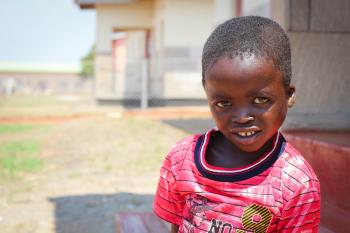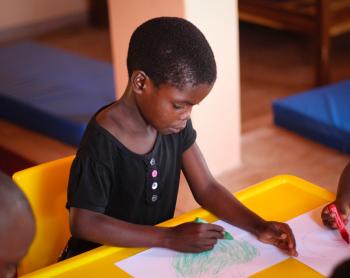Crippling poverty affects the lives of the majority

Chipata is the capital of Zambia’s Eastern Province, located near the border with Malawi, and has a population of over 450,000. Most people make a living in agriculture, mainly as small-scale subsistence farmers.
Poverty levels remain high in Chipata District, with over 50 per cent of the population living in extreme poverty, unable to meet basic needs such as having sufficient food or clean drinking water. The situation in rural areas is particularly severe: only one percent are not living in poverty.
Partly as a result of poverty, infant mortality rates continue to be very high, at 94 per 1000 live births. Incidences of malaria and other major diseases also continue to be widespread, in part due to the lack of safe drinking water and sanitation.
Over 66 per cent of children under the age of five are estimated to suffer from stunting (below age-appropriate height), which is a direct result of malnutrition. Although so many families live off farming, they often struggle to feed themselves with enough nutritious food.
When parents take ill, children are often left to fend for themselves
An estimated 20 per cent of households in the region are female headed, in part due to the high HIV/AIDS rates in the region, with over nine per cent of the local population affected. Without AIDS, life expectancy in Chipata lies at around 51 years, but for those affected by AIDS it is just 37 years. Over 33,000 children in the region who have lost parental care due to AIDS.
Over half of primary-aged children do not go to school. Of those who do attend primary school, only around 30 per cent continue onto secondary school. Girls are particularly at risk of dropping out due to early pregnancies and marriage. Around 45 per cent of adults are illiterate. This severely hampers people’s chances of escaping poverty – without being able to read and write it is much harder to find ways to make a living.
What we do in Chipata

SOS Children’s Villages began supporting vulnerable families and children in Chipata in 2011.
Strengthen families: We work in partnership to reach out to struggling families in the region, especially those affected by HIV/AIDS. The aim is to alleviate hardship and maintain family stability so that children will be safe and protected, and grow up in a loving home. We ensure that children have access to essential health and nutritional services, as well as education. We assist parents by providing guidance on income-generating skills and parenting practices, as well as counselling and psychological support where needed. In cooperation with local organisations, we also work towards strengthening the support systems for vulnerable families within the community. Around 600 children and their families benefit from our support.
Care for children who cannot live with their families: For children from the region who are no longer able to live with their parents, SOS families can provide a loving home. In each family, the children live with their brothers and sisters, affectionately cared for by their SOS parent.
Whenever possible, we make sure that children stay in touch with their families of origin. In some cases, we support the family so that the children can return to live with them.
Support for young people: SOS Children’s Villages provides guidance and financial help to young people until they can live independently.
Education: SOS Children’s Villages runs a kindergarten in Chipata, where up to 90 children are looked after, having fun and getting ready to go to school. We work in partnership with the local school, thus improving the quality of education that the children can receive.